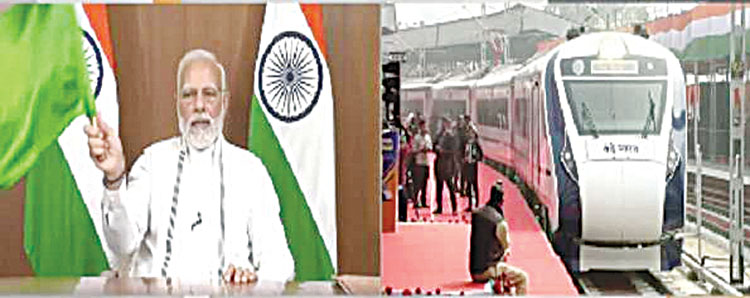New Delhi, Dec 30 (Representative) Hours after performing last rites of mother Heeraben Modi on Friday, Prime Minister Narendra Modi flagged off the Vande Bharat Express, connecting Howrah to New Jalpaiguri via video conferencing. The ultra-modern Semi High-Speed Train is equipped with state-of-the-art passenger amenities. The train will stop at Malda Town, Barsoi and Kishanganj stations en route in both directions.The Prime Minister also inaugurated the Joka-Taratala Stretch of the Joka-Esplanade Metro Project (Purple Line). He also dedicated four railway projects to the nation including Boinchi – Shaktigarh 3rd Line, Dankuni – Chandanpur 4th Line Project, Nimtita – New Farakka Double Line and Ambari Falakata – New Maynaguri – Gumanihat Doubling Project. Modi also laid the foundation stone for the redevelopment of the New Jalpaiguri Railway Station. Addressing the gathering, the Prime Minister apologised for not being physically present. “Land from where the call of Vande Matram originated, saw the flagging off of Vande Bharat today,” he said.He further said that India had taken a resolve to start 475 Vande Bharat trains during the celebrations of the Azadi ka Amrit Mahotsav and the train being flagged off from Howrah to New Jalpaiguri is one of them.Mentioning the multiple projects whose foundation stones are being laid and inaugurated, the Prime Minister said that the government is spending approximately 5000 crores for the completion of these projects. The Prime Minister also informed that he will get the opportunity to dedicate many projects pertaining to the cleanliness of the Ganga and drinking water to West Bengal later in the day. He informed that more than 25 sewage projects have been approved in West Bengal under the Namami Gange Scheme. Out of which 11 projects are already complete and seven are being completed today. Work on 5 new schemes with an outlay of Rs 1500 crore is starting today.The Prime Minister mentioned one of the key projects i.e. Adi Ganga project for cleaning of which infrastructure worth 600 crore rupees is being established. The Prime Minister said that along with cleaning rivers, the central government has focussed on prevention which revolves around creating a large number of modern sewage treatment plants. This is being done keeping in mind the requirements of the next 10-15 years.
A nationwide campaign is going on to transform the Indian Railway, he said. He listed modern trains like Vande Bharat, Tejas Hum Safar and Vista Dome coaches and the modernisation of Railway Stations including New Jalpaiguri, doubling and electrification of Railway lines as examples of this modernization.He also mentioned eastern and Western dedicated freight corridors as projects that will bring revolutionary changes in the logistics sector. The Prime Minister emphasised that in the last 8 years, Indian Railways worked on the foundation of modernity and the coming years will see Indian Railway embarking on a new journey of modernization.He informed that while 20 thousand route kilometre rail lines were electrified in the first 70 years of Independence, more than 32 thousand route kilometres have been electrified since 2014. The Prime Minister said that the Metro Rail system is an example of India’s speed and scale today. “Metro network which was less than 250 km before 2014 had the highest share in Delhi-NCR. In the last 7-8 years Metro has expanded to more than 2 dozen cities. Today Metro is running on an approximately 800 km long Metro track in different cities of the country. Work is going on Metro routes of more than 1000 km,” he informed. Referring to the challenges posed to India in the yesteryears, the Prime Minister remarked that it had a very negative effect on the development of India. Throwing light on one of the key challenges, the Prime Minister highlighted the lack of coordination among various agencies involved in the infrastructural development of the nation. He also mentioned the lack of coordination among the various transport agencies. “As a result, one government agency had no clue about the work being done by other agencies. This had a direct impact on the honest taxpayers of the country,” he said.
The Prime Minister remarked that when their hard-earned money is used in filling the pockets of the corrupt rather than the poor, it is natural to be dissatisfied. “The Government launched the PM Gati Shakti Plan to fill the gaps in the coordination of agencies,” he remarked. “Be it different state governments, construction agencies or industry experts, everyone is coming together on the Gati Shakti Platform.” He further added that PM Gati Shakti is not only limited to conjoining the different mediums of transport in the country but also providing pace to the multimodal projects. The Prime Minister further added that the construction of new airports, waterways, ports and roads is being carried out to ensure seamless connectivity for the citizens. “We must make correct use of the potential of the nation to move forward in the 21st century,” the Prime Minister remarked. Highlighting the waterways in the country, the Prime Minister recalled the time when waterways were used on a large scale for work, business and tourism in India but were later destroyed during the years of slavery. He also pointed out the lack of efforts by the previous governments in reviving the waterways in the country.” India is working toward boosting its Jal Shakti today,” Modi said. He informed that more than 100 waterways are being developed today and work is taking place to introduce advanced cruise ships in the rivers while boosting business and tourism. The Prime Minister also highlighted the Ganga-Brahmaputra project that is being carried out between India and Bangladesh to establish waterway links between the two rivers. West Bengal Chief Minister Mamata Banerjee, Governor Dr CV Ananda Bose, Union Minister for Railways Ashwini Vaishnav, Union Ministers of State John Barla, Dr Subhas Sarkar and Nisith Parmanik were those present on occasion among others.

